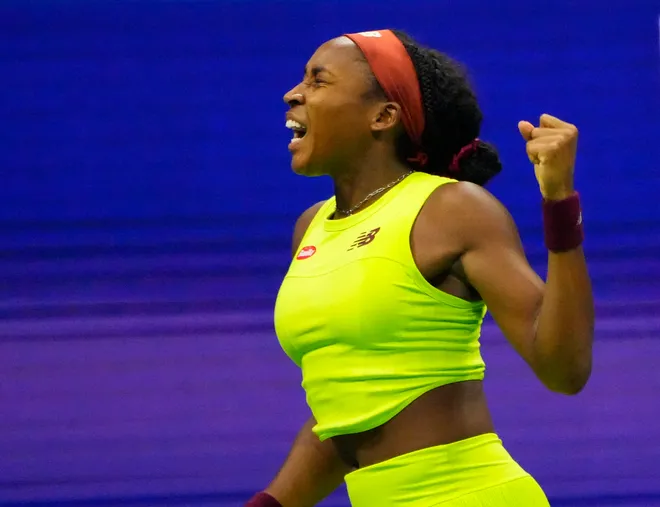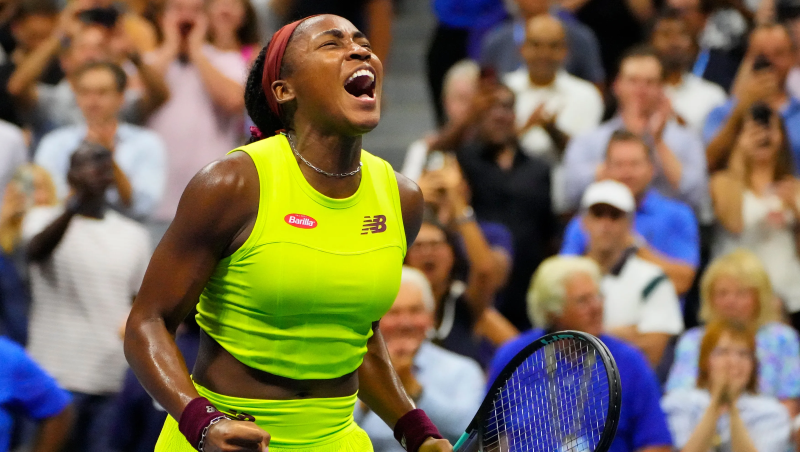Coco Gauff navigates delay created by environmental protestors, reaches US Open final
NEW YORK — Coco Gauff has been on such a fast track to the top of women’s tennis that it’s often taken for granted how much she's accomplished at the age of 19.
In this sport, winning WTA titles and reaching the top-10 is important. But winning Grand Slams is everything.
And on Saturday, Gauff will have a chance to forever end the questions about when she’s going to break that threshold.
Gauff, the No. 6 seed, reached her first US Open final after beating No. 10 Karolina Muchova of the Czech Republic on Thursday night, 6-4, 7-5.
"It was a tough match," Gauff said. "It was a lot of emotional challenges in the match but I think I did a good job of staying focused and I'm really proud of myself today."
Gauff will face Aryna Sabalenka, the Belarusian who won the Australian Open in January and will ascend to the world No. 1 ranking for the first time on Monday regardless of the result in the final. Sabalenka beat American Madison Keys in a deciding tiebreaker, turning around a disastrous start to win 0-6, 7-6, 7-6 (10-5). Keys held a break lead in each of the last two sets but was unable to finish the job, giving Sabalenka the opportunity to win a US Open semifinal after bitter losses the last two years.
Gauff had an easier time than Sabalenka in the score line Thursday but had to survive a potential momentum-killing delay early in the second set that stretched for 49 minutes when four environmental protesters began yelling from the upper deck. Though police were able to quickly remove three of them, one had glued their feet to the floor, necessitating an entire team of security to handle the disturbance.

Fortunately, neither player seemed too bothered by the delay as both seemed to settle back into the match immediately. Gauff, who has used her platform to advocate for social justice on a variety of issues, said she "definitely" believes that climate change is real and was not upset with the protesters.
"Throughout history, moments like this are defining moments," she said. "Would I prefer it not happen in my match? 100 percent, yeah, but it is what it is and I had a feeling it was going to happen this tournament. It happened at the French Open, happened at Wimbledon, so following the trend it was going to happen here... I know the stadium was (angry) but I always speak about preaching about what you feel and what you believe in and it was done in a peaceful way so I can't get too mad about it."
Though Gauff reached the French Open final last year, there was a sense throughout 2023 that her game had plateaued. After a decisive quarterfinal loss in Paris to eventual champion Iga Swiatek and then a first-round exit at Wimbledon to Sofia Kenin, Gauff overhauled her coaching team by hiring former ATP pro Pere Riba and Brad Gilbert, the ESPN commentator who coached Andre Agassi and Andy Roddick to Grand Slam titles.
With a new team in place to start the North American hard court season, Gauff called it a rebuilding phase. But immediately she began the best run of her career, winning the Washington event and then adding the title in Cincinnati two weeks later, beating Swiatek for the first time in eight tries.
When the US Open draw came out, it appeared Gauff was headed for yet another Swiatek showdown in the quarterfinals. But when Jelena Ostapenko upset Swiatek in the fourth round, a huge obstacle in Gauff’s path was cleared. She now enters the final having won 17 of her last 18 matches but said she has never felt like one of the favorites to win this title.
"After Wimbledon I wasn't expecting to do well in the hard court season so I'm proud of the way I’ve been able to change the season around," she said. "I was thinking offseason and preparing for the next year, and I still think I have a lot to improve. I wasn't thinking these results would happen."
The match against Muchova, whom she beat in the Cincinnati final, showed some of the maturity that Gauff has gained since the coaching change.
Starting the match with a series of high, looping ground strokes that targeted Muchova's backhand and helped negate the effectiveness of her slice, Gauff seemed to possess both calm and clarity about her gameplay.
Muchova, who lost in the French Open final earlier this year, played with tape on her right forearm in the quarterfinals and showed up Thursday wearing a black arm sleeve to cover it. But whatever soreness she was feeling in the arm paled in comparison to the nerves she seemed to be fighting early in the match.
While Gauff played steadily, Muchova struggled to execute in their baseline exchanges and found no more luck when she approached the net. Though Muchova’s game picked up a bit after falling behind 5-1, Gauff was steady enough to finish off the first set as Muchova added three more unforced errors to finish with 17 against just three winners.
"I'm pretty sad about the outcome, that I didn't put the best out of me on the court," Muchova said. "I think under pressure I can play good, but with a match like this I cannot wait until when I'm, like, in the corner to play my best tennis."
Muchova played more characteristically in the second set and used the variety in her shots to ask Gauff more questions than she faced in the first. But Muchova unraveled while serving at 3-4, and for a moment it appeared like that would be decisive. After missing a routine overhead smash at 15-15 and then double faulting at 40-30, Muchova handed Gauff a chance to break — which she did when Muchova buried a backhand into the net.
Though Gauff couldn't convert on her first attempt to finish as Muchova fought off a match point and eventually broke serve, it only delayed the outcome — which seemed to be the theme of the night. Serving at 5-6, Muchova began the game with a double fault and had to fight off four more match points to stay alive. But Gauff was able to win a 40-shot rally, the lengthiest exchange of the match, with a running forehand winner to give herself one more shot to finish things off.
She took it this time, forcing a miss from Muchova and threw her fist in the air to celebrate her first Slam final on home soil.
"When you're 20 shots into the rally, it's tough to go for a winner because you're not as fresh on energy but I knew I had the legs and lungs to outlast her," Gauff said. "It was whether I had the mentality and patience to do it. After 10 or 15 shots in I was like, 'this is going to change the match' and I knew if I could win that rally I felt the next point was going my way."

Disclaimer: The copyright of this article belongs to the original author. Reposting this article is solely for the purpose of information dissemination and does not constitute any investment advice. If there is any infringement, please contact us immediately. We will make corrections or deletions as necessary. Thank you.







